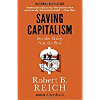Your typical wage is below what it was in the late 1970s, in terms of what it can buy. Two-thirds of you are living paycheck to paycheck. Almost 30 percent of you don’t have steady employment: You’re working part-time or on contract, with none of the labor protections created over the last 80 years – no unemployment insurance if you lose your job, no worker’s compensation if you’re injured, no time-and-a-half pay for working more than 40 hours a week, no minimum wage, and you have to pay your own Social Security. Over 37 percent of you have dropped out of the workforce altogether because you’ve become too discouraged even to look for work. That’s a near record. As if all this weren’t enough, the schools and infrastructure on which you rely have been neglected, and the ravages of climate change – droughts, fires, and floods – are worsening.
Yet the American economy is twice as large as it was in the late 1970s. As a nation, we are richer than we’ve ever been. We could afford to do so much better.
None of this has happened by accident. Those with great wealth have translated it into political power. And with that power they’ve busted labor unions (to which a third of private-sector workers belonged in the 1950s but now fewer than 7 percent do), halved the taxes they pay (from a top marginal rate of 91 percent in the 1950s to 39 percent today, and from an effective rate of 52 percent then to 18 percent now), cut safety nets, deregulated Wall Street, privatized much of the economy, expanded bankruptcy protection for themselves while narrowing it for you, forced you into mandatory arbitration of employment disputes, expanded their patents and intellectual property, got trade deals that benefited them but squeezed your pay, and concentrated their market power so you pay more for pharmaceuticals, health insurance, airfare, food, internet service, and much else.
This is bad for everyone. Even those at the top would do better with a smaller share of an economy that was growing because the middle class was expanding. And they’d do better in a society that hadn’t become so angry and susceptible to demagogues blaming immigrants and imports for what has happened.
But none of this will change unless we change it. No single person – not even Bernie Sanders, had he become president – can do what needs to be done, alone. You and I and others must continue to organize and mobilize. Do not find refuge in cynicism. Change is slow, and at times seems hopeless. But change is inevitable. Do not wait for politicians to take the lead. We are the leaders.
About the Author
 ROBERT B. REICH, Chancellor’s Professor of Public Policy at the University of California at Berkeley, was Secretary of Labor in the Clinton administration. Time Magazine named him one of the ten most effective cabinet secretaries of the last century. He has written thirteen books, including the best sellers “Aftershock" and “The Work of Nations." His latest, "Beyond Outrage," is now out in paperback. He is also a founding editor of the American Prospect magazine and chairman of Common Cause.
ROBERT B. REICH, Chancellor’s Professor of Public Policy at the University of California at Berkeley, was Secretary of Labor in the Clinton administration. Time Magazine named him one of the ten most effective cabinet secretaries of the last century. He has written thirteen books, including the best sellers “Aftershock" and “The Work of Nations." His latest, "Beyond Outrage," is now out in paperback. He is also a founding editor of the American Prospect magazine and chairman of Common Cause.
Books by Robert Reich
Saving Capitalism: For the Many, Not the Few -- by Robert B. Reich
 America was once celebrated for and defined by its large and prosperous middle class. Now, this middle class is shrinking, a new oligarchy is rising, and the country faces its greatest wealth disparity in eighty years. Why is the economic system that made America strong suddenly failing us, and how can it be fixed?
America was once celebrated for and defined by its large and prosperous middle class. Now, this middle class is shrinking, a new oligarchy is rising, and the country faces its greatest wealth disparity in eighty years. Why is the economic system that made America strong suddenly failing us, and how can it be fixed?
Click here for more info or to order this book on Amazon.
Beyond Outrage: What has gone wrong with our economy and our democracy, and how to fix it -- by Robert B. Reich
 In this timely book, Robert B. Reich argues that nothing good happens in Washington unless citizens are energized and organized to make sure Washington acts in the public good. The first step is to see the big picture. Beyond Outrage connects the dots, showing why the increasing share of income and wealth going to the top has hobbled jobs and growth for everyone else, undermining our democracy; caused Americans to become increasingly cynical about public life; and turned many Americans against one another. He also explains why the proposals of the “regressive right” are dead wrong and provides a clear roadmap of what must be done instead. Here’s a plan for action for everyone who cares about the future of America.
In this timely book, Robert B. Reich argues that nothing good happens in Washington unless citizens are energized and organized to make sure Washington acts in the public good. The first step is to see the big picture. Beyond Outrage connects the dots, showing why the increasing share of income and wealth going to the top has hobbled jobs and growth for everyone else, undermining our democracy; caused Americans to become increasingly cynical about public life; and turned many Americans against one another. He also explains why the proposals of the “regressive right” are dead wrong and provides a clear roadmap of what must be done instead. Here’s a plan for action for everyone who cares about the future of America.
Click here for more info or to order this book on Amazon.




























